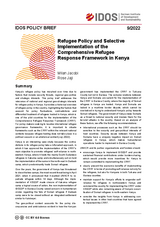Refugee policy and selective implementation of the Comprehensive Refugee Response Framework in Kenya
Jacobi, Milan / Rose JajiPolicy Brief (9/2022)
Bonn: German Institute of Development and Sustainability (IDOS)
DOI: https://doi.org/10.23661/ipb9.2022
Kenya’s refugee policy has morphed over time due to factors that include security threats, regional geo-politics and strategic interests. This policy brief addresses the relevance of national and regional geo-strategic interests for refugee policy in Kenya. It provides a historical overview of refugee policy in the country, highlighting the factors that account for policy fluctuations, contradictions and differential treatment of refugees hosted in Kenya, which is one of the pilot countries for the implementation of the Comprehensive Refugee Response Framework (CRRF). For policy-makers seeking to localise international refugee governance frameworks, it is important to situate frameworks such as the CRRF within the relevant national contexts because refugee hosting does not take place in a political vacuum or an ahistorical context (Jaji, 2022).
Kenya is an interesting case study because the contra-dictions in its refugee policy take a bifurcated approach, in which it has approved the implementation of the CRRF’s main objective to promote refugees’ self-reliance in north-western Kenya, where it hosts the mainly South Sudanese refugees in Kakuma camp and simultaneously put on hold the implementation of the same in the north-east in Dadaab camp, which predominantly hosts Somali refugees.
Over the years, the government of Kenya has threatened to close the two camps, the most recent threat being in April 2021, when it announced that it wanted UNHCR to re-patriate refugees within 14 days. Although the imple-mentation of KISEDP made closure of Kakuma refugee camp a logical course of action, the non-implementation of GISEDP in Garissa County raised concern in humanitarian circles regarding the fate of Somali refugees if Dadaab camp were to be closed without an integrated settlement similar to Kalobeyei.
The geo-political context accounts for the policy dis-crepancies and ambivalence evident in how the Kenyan
government has implemented the CRRF in Turkana County but not in Garissa. The complex relations between Kenya and Somalia are salient for the implementation of the CRRF in Garissa County, where the majority of Somali refugees in Kenya are hosted. Kenya and Somalia are locked in a maritime border dispute, which cannot be overlooked in trying to understand Kenya’s policy towards Somali refugees. The government of Kenya views Somalis as a threat to national security and blames them for the terrorist attacks in the country. Based on an analysis of these factors, we offer the following recommendations:
• International processes such as the CRRF should be sensitive to the security and geo-political interests of host countries. Security issues between Kenya and Somalia have a uniquely negative impact on Somali refugees in Kenya, which makes humanitarian operations harder to implement in Garissa County.
UNHCR and its partner organisations and funders should:
• encourage Kenya to implement GISEDP and provide sustained financial contributions under burden-sharing, which would provide more incentives for Kenya to remain committed to implementing the CRRF.
• clearly present the economic benefits of implementing the CRRF in terms of promoting self-reliance not only for the refugees, but also for Kenyans in both Turkana and Garissa counties.
• maintain support for Kenya’s efforts to engender self-reliance for refugees in north-western Kenya and commend the country for implementing the CRRF under KISEDP while also remaining aware of Kenya’s securi-tisation of Somali refugees in north-eastern Kenya.
• consider the insights from Kenya in addressing con-textual issues in other host countries that have agreed to implement the CRRF.


